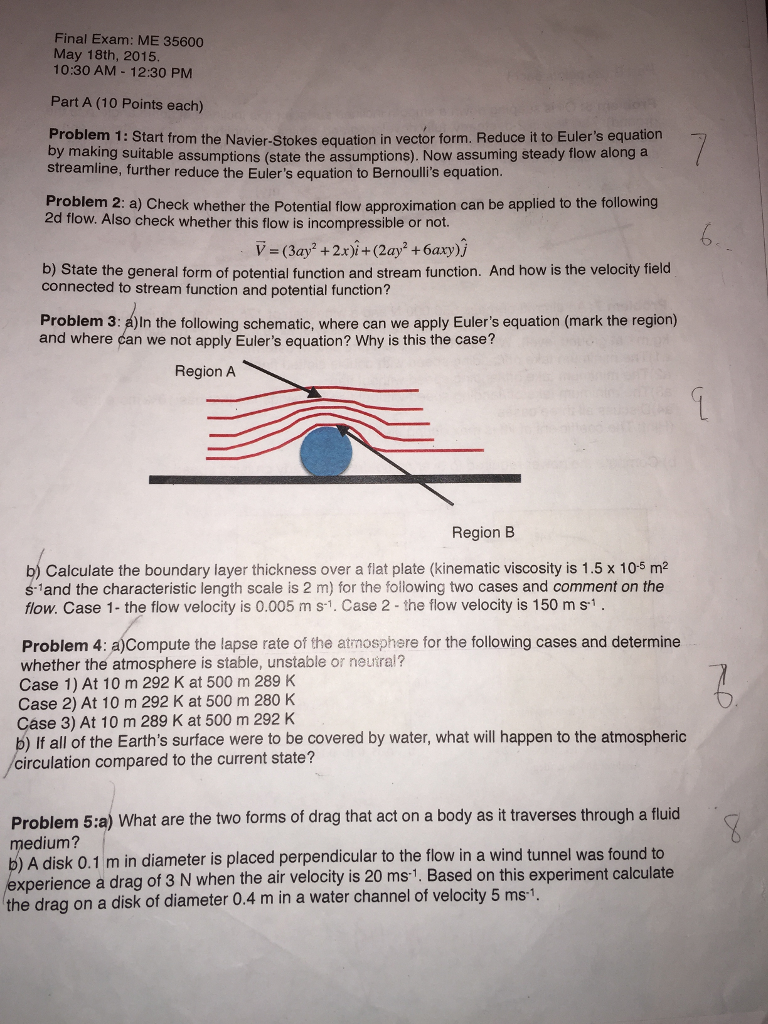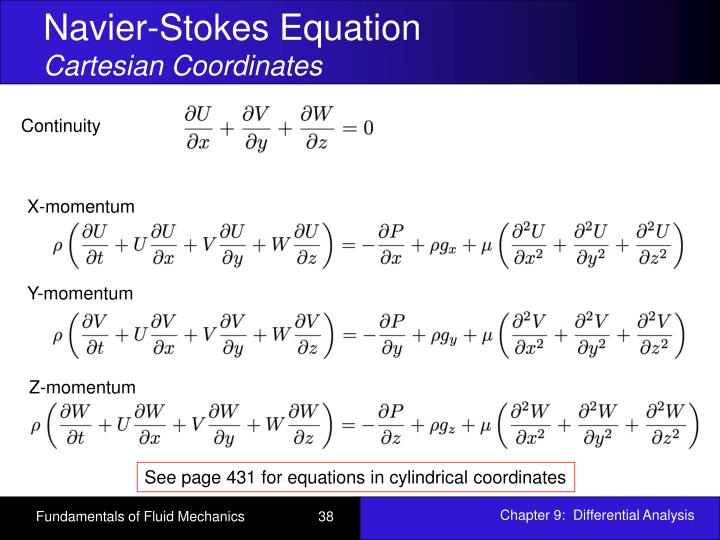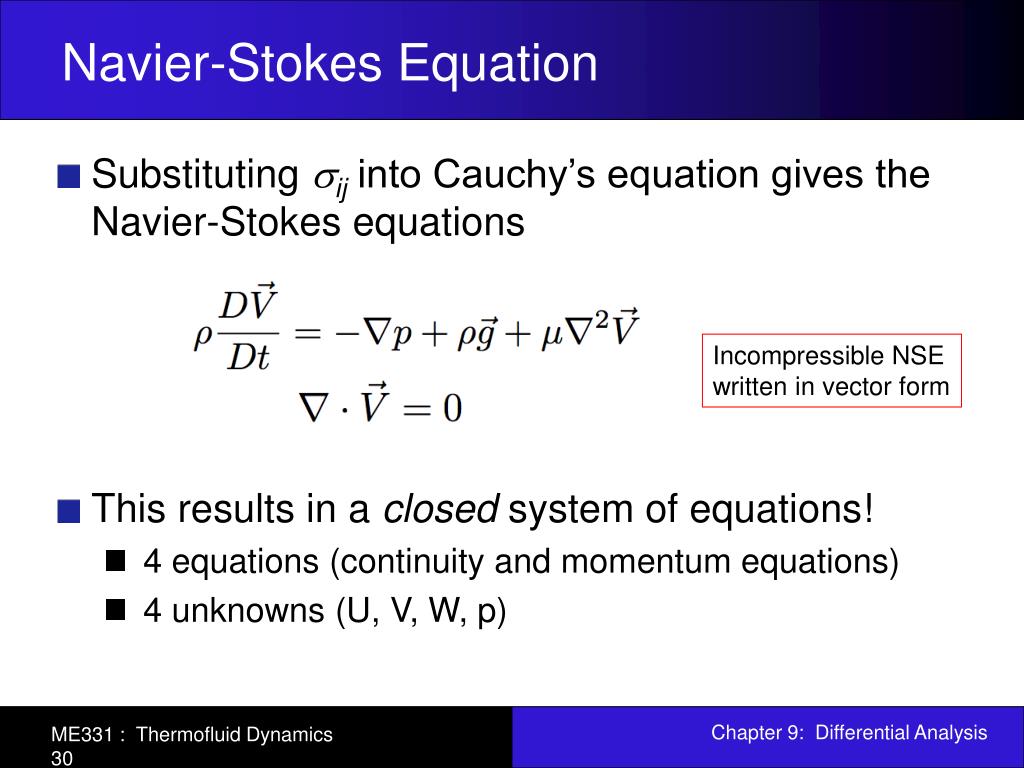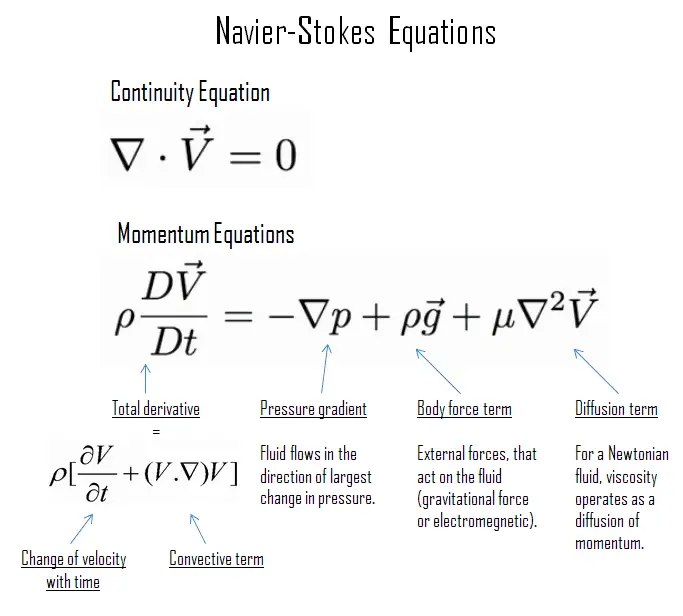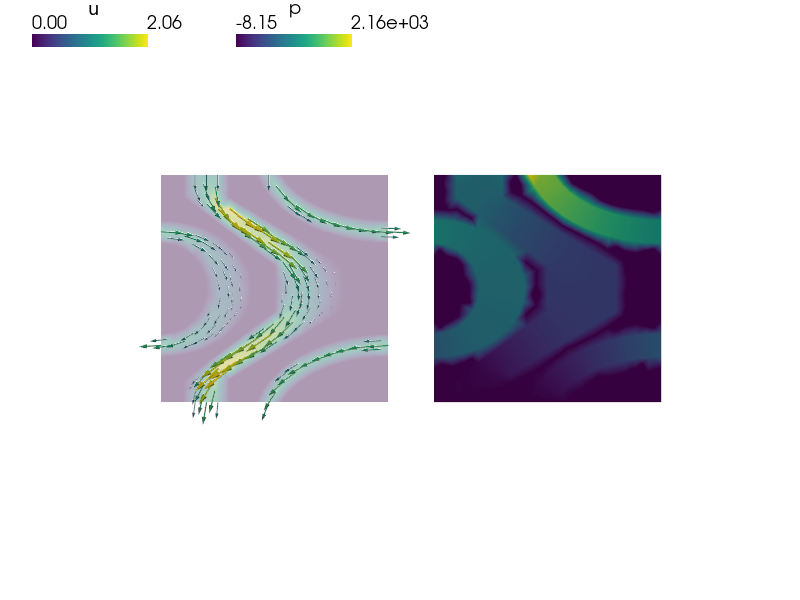Navier Stokes Vector Form
Navier Stokes Vector Form - Why there are different forms of navier stokes equation? This is enabled by two vector calculus identities: In the analysis of a flow, it is often desirable to reduce the number of equations and/or the number of variables. Web 1 answer sorted by: One can think of ∇ ∙ u as a measure of flow. Web where biis the vector of body forces. For any differentiable scalar φ and vector a. If we want to derive the continuity equation in another coordinate system such as the polar, cylindrical or spherical. These may be expressed mathematically as dm dt = 0, (1) and. Web the vector form is more useful than it would first appear.
Web 1 answer sorted by: This equation provides a mathematical model of the motion of a. (10) these form the basis for much of our studies, and it should be noted that the derivation. In the analysis of a flow, it is often desirable to reduce the number of equations and/or the number of variables. Writing momentum as ρv ρ v gives:. Web where biis the vector of body forces. Why there are different forms of navier stokes equation? This is enabled by two vector calculus identities: If we want to derive the continuity equation in another coordinate system such as the polar, cylindrical or spherical. One can think of ∇ ∙ u as a measure of flow.
This is enabled by two vector calculus identities: Web 1 answer sorted by: Writing momentum as ρv ρ v gives:. One can think of ∇ ∙ u as a measure of flow. For any differentiable scalar φ and vector a. (10) these form the basis for much of our studies, and it should be noted that the derivation. If we want to derive the continuity equation in another coordinate system such as the polar, cylindrical or spherical. These may be expressed mathematically as dm dt = 0, (1) and. This equation provides a mathematical model of the motion of a. Why there are different forms of navier stokes equation?
NavierStokes Equations Equations, Physics and mathematics
In the analysis of a flow, it is often desirable to reduce the number of equations and/or the number of variables. (10) these form the basis for much of our studies, and it should be noted that the derivation. Why there are different forms of navier stokes equation? Writing momentum as ρv ρ v gives:. One can think of ∇.
Solved Start from the NavierStokes equation in vector form.
Why there are different forms of navier stokes equation? For any differentiable scalar φ and vector a. In the analysis of a flow, it is often desirable to reduce the number of equations and/or the number of variables. This is enabled by two vector calculus identities: Web 1 answer sorted by:
The many forms of NavierStokes YouTube
In the analysis of a flow, it is often desirable to reduce the number of equations and/or the number of variables. Why there are different forms of navier stokes equation? This equation provides a mathematical model of the motion of a. Writing momentum as ρv ρ v gives:. For any differentiable scalar φ and vector a.
PPT Chapter 9 Differential Analysis of Fluid Flow PowerPoint
If we want to derive the continuity equation in another coordinate system such as the polar, cylindrical or spherical. Writing momentum as ρv ρ v gives:. Why there are different forms of navier stokes equation? Web the vector form is more useful than it would first appear. (10) these form the basis for much of our studies, and it should.
(PDF) Closed form solutions for the SteadyState
This equation provides a mathematical model of the motion of a. This is enabled by two vector calculus identities: For any differentiable scalar φ and vector a. Writing momentum as ρv ρ v gives:. Web where biis the vector of body forces.
PPT Chapter 9 Differential Analysis of Fluid Flow PowerPoint
Web where biis the vector of body forces. These may be expressed mathematically as dm dt = 0, (1) and. This equation provides a mathematical model of the motion of a. This is enabled by two vector calculus identities: Writing momentum as ρv ρ v gives:.
NavierStokes Equations Definition & Solution
For any differentiable scalar φ and vector a. Web 1 answer sorted by: In the analysis of a flow, it is often desirable to reduce the number of equations and/or the number of variables. Web the vector form is more useful than it would first appear. (10) these form the basis for much of our studies, and it should be.
Resources ME 517 Lecture 19 Microfluidics Continuum
This equation provides a mathematical model of the motion of a. Web the vector form is more useful than it would first appear. These may be expressed mathematically as dm dt = 0, (1) and. This is enabled by two vector calculus identities: For any differentiable scalar φ and vector a.
navier_stokes/stokes.py — SfePy version 2021.2 documentation
For any differentiable scalar φ and vector a. These may be expressed mathematically as dm dt = 0, (1) and. Web where biis the vector of body forces. This equation provides a mathematical model of the motion of a. Writing momentum as ρv ρ v gives:.
The NavierStokes equations of fluid dynamics in threedimensional
Web 1 answer sorted by: Why there are different forms of navier stokes equation? Web where biis the vector of body forces. (10) these form the basis for much of our studies, and it should be noted that the derivation. Writing momentum as ρv ρ v gives:.
This Is Enabled By Two Vector Calculus Identities:
Writing momentum as ρv ρ v gives:. Web the vector form is more useful than it would first appear. These may be expressed mathematically as dm dt = 0, (1) and. (10) these form the basis for much of our studies, and it should be noted that the derivation.
If We Want To Derive The Continuity Equation In Another Coordinate System Such As The Polar, Cylindrical Or Spherical.
One can think of ∇ ∙ u as a measure of flow. This equation provides a mathematical model of the motion of a. In the analysis of a flow, it is often desirable to reduce the number of equations and/or the number of variables. Web where biis the vector of body forces.
Web 1 Answer Sorted By:
Why there are different forms of navier stokes equation? For any differentiable scalar φ and vector a.

